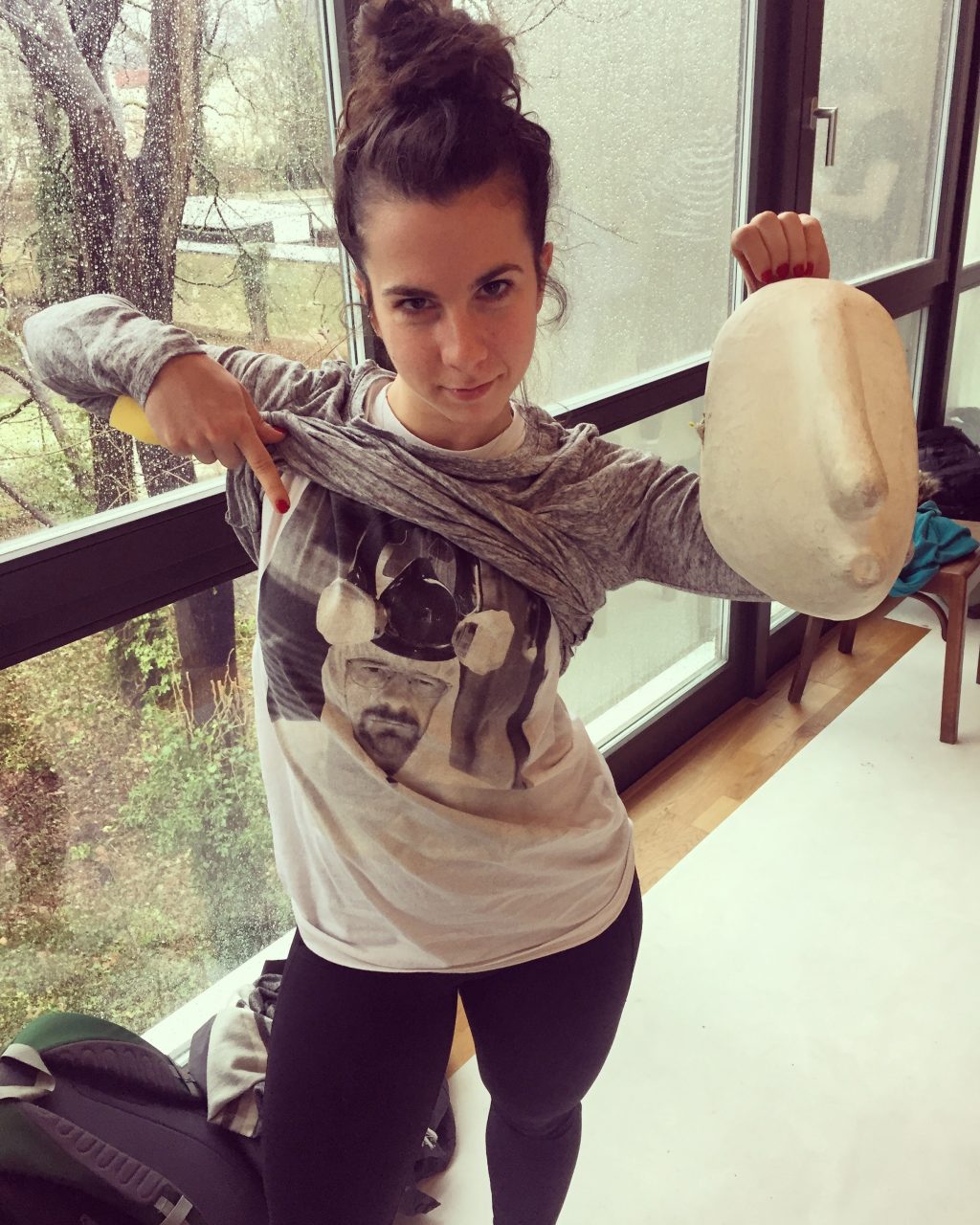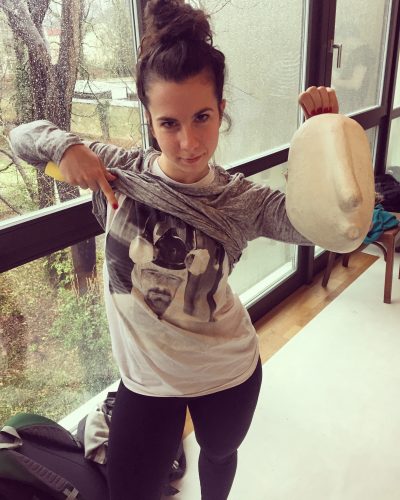
And Now…A Word from Our Cohort!
After six months, you’ve heard plenty from me. Now it’s time to hear a bit from the other Columbia cohort members, who were gracious enough to answer some of my questions. What I loved was that we had similar answers most of the time, but they are filtered through our unique voices. Now I’ll just let Claire Kaplan, Julia McIntyre, Richie Schiraldi, Gabrielle Wilson, Raquel Torre, Christopher Gliege, Ben Heustess, Rachel Paul, Meka Clifford, Ashley Hollinghead, and Fate Olsen speak for themselves!

Gab chilling with our honorary 13th cohort member, Larval Mask.
What has been the most challenging part about your time in Berlin?
Claire: Hardest thing about being in Berlin—probably life balance. I really want to pre-cook all of my healthy meals, exercise or meditate outside of class, paint, learn German, meet Berliners, keep my relationships with friends and family strong, keep up with the news and American politics, AND go out and have fun on the weekends. Accepting that sometimes all I can manage is class and rest, that I have to go easy on myself and my body, is tough. As I develop as an artist and a person, I see very clearly what habits I want to cultivate—but I don’t have the time or energy to do it all.
Julia: The most challenging part of the time in Berlin so far has been how to balance the energies of work and play, specifically in terms of artistry development and when is it necessary to break from the bubble of the program. It’s important to gain some perspective on what is available to pursue in the time and world now. Another aspect has been figuring out how to work with a fluctuating schedule to create time for myself. I love to explore and take advantage of the city outside of the artistic realm and take the time to reflect on what’s important to me as a person in this life. It has been a wonderful challenge to incorporate into my life, and it has drilled in the reality that life fluctuates and changes. It’s open, and things are always in flux alongside the fixed points. Remembering to put on the glasses of opportunity to view the challenges that arise within the program and in life has been an important part of this journey. I am grateful to have had the life insurance to be provided the prescription to.
Richie: I would say the most challenging part about my time in Berlin has been actually having the time to land in Berlin. The program fortunately, and unfortunately, takes up so much of my time, space, and mental, emotional, and physical capacity that I hardly have a chance to go out and explore the city for what it is. It’s fantastic, because this is why am here: to immerse myself fully into a program and grow as an artist and a person. However, there so much of Berlin’s culture I have yet to experience. Some weekends, I have a moment to spare to go explore, but most of my weekend is spent running errands, researching, doing homework, and resting my body. It’s been very important to me because of this that when we have any of our long breaks that I don’t immediately begin to travel. I save some of my time at the beginning and the end of the break to discover a bit more of Berlin.
What experience at LISPA/Columbia has had the most influence on your journey so far?
Gab: The collaborations with people/artists from all over the world. Our classes are incredibly valuable at LISPA but major learning has come from working with people of all different languages and cultures. I think about the art I came in wanting to make and the artist I was and it has since shifted from the influences of my colleagues and that I am very grateful for. Every person that I interact with everyday has a passion inside of them that is contagious and their own and that has been incredibly inspiring to see and learn from. I will leave here with countless lessons, stimulations, and ideas that I may have never thought of without the clashing of worlds here at LISPA.
Raquel: The space LISPA provides for personal and artistic growth is like nothing I’ve experienced, even in other theatre programs. There is a real and honest encouragement for us to discover our own theatrical language. The approach is at times holistic, providing a lot of space for self-awareness and reflection on our process as artists. This is probably what has influenced me the most, an approach to creating theatre that involves an accuse sense of awareness and connectivity.
Christopher: My journey at LISPA has been a wild one. The experience of being in a foreign country and working with artists from all over the world has been the most influential part of my time here. I have never felt more confused, excited, challenged, tired, and unbelievably grateful. Being at LISPA Berlin has truly deepened and enriched my work as a theatre maker. You really benefit from having a multi-cultural, multi-lingual cohort and teaching staff. Lost in translation. Extremely rewarding. This life is so boring when we understand each other all the damn time.
What is your favorite part about Berlin?
Ben: My favorite thing about Berlin is the history this city holds. With such a rich history, people from all over the world flock to Berlin go live and experience the culture that only this city possesses. I’ve enjoyed having every opportunity to create and witness art in a city that is a piece of art in and of itself.
Rachel: The great diversity of cultures has given me a lot to learn and think on. I’ve developed relationships with very interesting people. I experienced what I consider my first real winter, which might be annoying to some, but as a girl from a small town in Texas, the slightest hint of snow equals Winter Wonderland for me. Berlin truly cares for the environment. They recycle absolutely everything, avoid waste when possible, use solar power whenever possible (even on a floating bar in a boat). They take climate change very seriously, and it has shown me so many ways I can easily help and do my part for our world. I’m learning practices which I will continue when I return to the US.
Meka: What I love most about Berlin is the feeling of subculture all over the city. It’s a culture specifically and totally unique to Berlin. It is one of the most artistic and diverse cities in the world. Cleaner than New York, and wider than London. The rebel energy of the city encourages self expression and openness to new experiences. My favorite part of Berlin, what I love most about Berlin, is the ability to be completely lost but also found at the same time.
What tip(s) would you give to someone coming into the EDPP program next year?
Fate: One of the most beneficial things for me was to have a chance to come to Berlin a few weeks early before class started. I felt I had time to get to know the area and explore before jumping into 9-12 hour days of work. I wouldn’t take back my first few weeks for anything!
Ashley: You really only need workout gear for one week if you do laundry every week and like 3 other outfits, maybe four if you really want to get fancy. Honestly, I only brought one medium suitcase and a backpack, and I still brought too much stuff. Second, instill in your friends/family the importance of Skype dates. Third, just be open and ready to play and willing to try everything. And show up. Showing up is more important than you think it is, especially as the year goes on. It really is the most important thing, though: showing up and trying.
